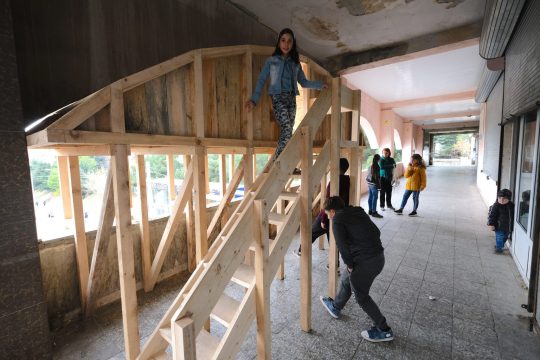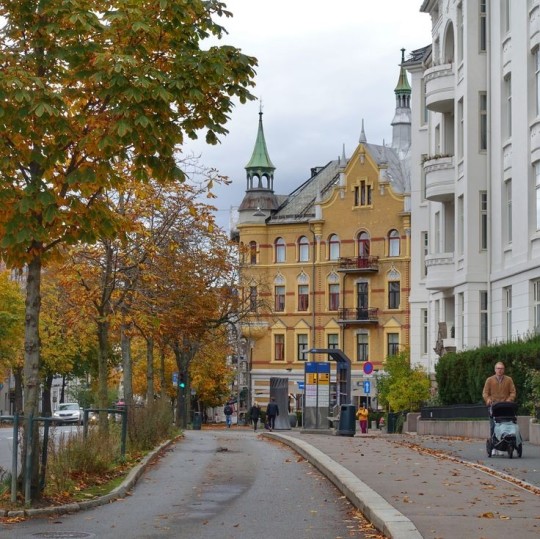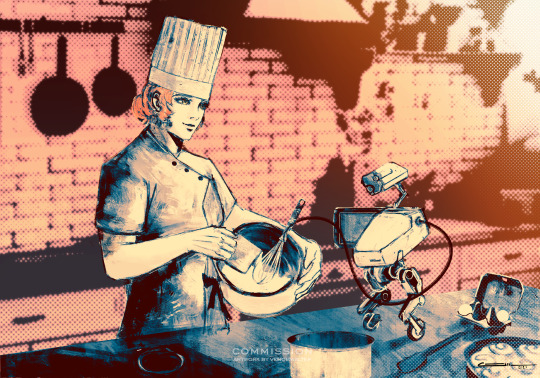#lina community
Text
Tinatin Gurgenidze: Between Two Cities
Continuing our talks on the Independent Coastal Radio NOR with Tinatin Gurgenidze, an architect and urban researcher from Georgia. She is one of the co-founders of the Tbilisi Architecture Biennial. Listen to new edition of Weltraum.

Explain me more about the Tbilisi architectural biennial?
Tinatin Gurgenidze: Since I've left Georgia, I always wanted to do something there. I started my PhD research about a neighbourhood in Tbilisi and at some point in 2017 spent half a year in Georgia. This is when the idea of making a cultural event in this district came up. With some friends we made this utopian idea of establishing an architectural biennial in 2017. Afterwards we managed to organise the first edition in 2018. The main reason was the lack of cultural activities in Georgia concerning architecture and also a lack of critical discourse. It was important to create a platform to bring different actors together and talk about certain topics. The second important reason was to engage with the city critically and talk about existing problems.

The inaugural Tbilisi Architecture Biennial was based in the suburb of Gldani. Photo is by Tako Robakidze
Do you also involve different communities in this discourse?
TG: The initial idea is to create it for the local audience but as we had less expertise, and we were lacking experiences of creating such events we made it quite international at the beginning. The local audience at first was not so much present, probably because it was the first time, they didn't really understand what we were doing, but it radically grew in the last two editions. Our audience is very different because we make very interdisciplinary activities. For example, in the last edition we had the film screenings where completely other audience attended compared to the symposium. Each activity has different audiences and it's always open to new people depending on what is happening. Participation wise it's quite international but oriented and based on local topics.

Young architects built guerrilla structures into existing buildings, like this pavilion by Maria Kremer. Photo is by Stefan Rusu
What did LINA offered the the biennial?
TG: This was probably the most important things for us, being part of LINA platform gave us so much connections throughout all Europe with different organisations and also so much support. Without LINA we have not gone so far. I feel very grateful for that, and I think we sometimes forget how important it is to come together and share, what LINA is doing. We've got also partners for another project that we have met through LINA.
How is to create such events in a precarious situation of work as a freelance?
TG: I am not completely a freelancer because I work for a local NGO in Berlin which is partnering with biennial and also my colleagues in Georgia they get their part time employment as well. Creative Europe funding allows us to have the salaries, which is a very positive thing. There is so much energy and time that we invested for free, overworking, but slowly with experiences and the results we get it pays back.
Your PhD thesis is based on the (post-) Soviet mass housing settlement of Gldani, a suburb of Tbilisi; What are you researching?
TG: It's a complicated story. When I started my PhD I did my research and stop it because of lack of time as I was involved in the organising the biennial. I have a plan to start again this year. It changed a lot from what I was researching and what I want to research now because I am working on the period of transformation after the break up of the Soviet Union and introduction of the market economy and how this influenced the built environment. I would like to research the typologies of the self-made structures and this transformation that happened in this period and archive the cases. I know the typologies will disappear but I would like to pay attention to this phenomena because this is also the period when self-made architecture was done and it's also an architectural style that needs to be studied.

Soviet mass housing settlement of Gldani, a suburb of Tbilisi. Photo © Tbilisi Architectural Biennial
Some people doesn't consider the self-made as an architectural style. I have to proof why it is it important to document this.
How did neoliberal period influenced on the architecture and society in Georgia?
TG: Extremely. From one radical system we entered to another radical system. This is having a massive influence, specially exploiting all the resources like selling out to foreign investors valleys and forests. The feeling of common ship is completely lost. This process has gone so far that since few years there are movements and protest. Since there is another side there is some hope. The situation is so extreme that people are also loosing their homes in a very brutal way. The banking system is super violent and influences drastically on people's life. The discourse is now opening more and more around the topic of common resources and that forests shouldn't be sold to one owner. People are slowly starting to understand this and these protest start from the region, they didn't started in the big cities, this fact makes it strong as well. It is very important that they reached the centre and are more and more people understand the problematic.
What about the privatisation of water in Georgia?
TG: We worked on this topic during the Venice biennial last year and we will continue to talk about it this year during the Tbilisi biennial. Water in Georgia is one of the most valuable resources as the territory in Georgia has so many different bodies of water - from nature springs to lakes, rivers, glacial, sea. The reality is that not everybody has equal access to the drinking water. Rather that some made water into a commodity and earning money from it, while on the other hand locals might not have the access to drinking water in their homes. It is a paradox how this can happen and a way of modern colonisation that affects environment and ecosystems because t's not really controlled. There is a problem of what kind of contracts are being made and how the natural resources are being sold out.


Exploring the Relationship Between Time and Energy: The Georgian Pavilion at the 2023 Venice Biennale is Curated by the Tbilisi Architecture Biennial Photo © Gigi Shukakidze
It is not possible to sell an entire valley or a river to a private investor, this is something that has to belong to the country and its people.
How do you see architecture in the future?
TG: A lot of rethinking must be done of what is architecture and what it can be in the future. We must really think if we need to build completely new buildings and urbanise so much territory. We must start to radically change not to build new things. It's proven many times that reconstruction is much more eco-friendly and cheaper. How much more can we build? According to the calculations where more people are coming into cities, we shall build more, but how far can we go? If we build more, more people will come therefore we need to find a balance between land, regions and cities, which can't grow endlessly.
Architecture is not an alone standing profession, it's connected with everything around it.
-
Tinatin Gurgenidze lives and works in Berlin. She studied architecture and urban design in Tbilisi and Barcelona. Trained as an architect and urban designer, Tinatin is involved in research and curatorial work regarding critical urban issues. She is one of the co-founders of the Tbilisi Architecture Biennial. Tinatin is also an author of several publications and articles in journals as ‘Architectural review’ and ‘Failed Architecture’. Currently, she is working on her PhD thesis concerning the (post-) Soviet mass housing settlement of Gldani, a suburb of Tbilisi. Tinatin’s work concentrates on a sociological approach towards architecture and urban space. In her work she tries to understand what happened to Gldani in the transition period after Georgia regained its independence in 1991.
Here You can listen to the WELTRAUM interview.

4 notes
·
View notes
Text
Inkjump Linkdump

For the rest of May, my bestselling solarpunk utopian novel THE LOST CAUSE (2023) is available as a $2.99, DRM-free ebook!

It's the start of a long weekend and I've found myself with a backlog of links, so it's time for another linkdump – the eighteenth in the (occasional) series. Here's the previous installments:
https://pluralistic.net/tag/linkdump/
Kicking off this week's backlog is a piece of epic lawyer-snark, which is something I always love, but what makes this snark total catnip for me is that it's snark about copyfraud: false copyright claims made to censor online speech. Yes please and a second portion, thank you very much!
This starts with the Cola Corporation, a radical LA-based design store that makes lefty t-shirts, stickers and the like. Cola made a t-shirt that remixed the LA Lakers logo to read "Fuck the LAPD." In response, the LAPD's private foundation sent a nonsense copyright takedown letter. Cola's lawyer, Mike Dunford, sent them a chef's-kiss-perfect reply, just two words long: "LOL, no":
https://www.techdirt.com/2024/04/19/apparel-company-gives-perfect-response-to-lapds-nonsense-ip-threat-letter-over-fuck-the-lapd-shirt/
But that's not the lawyer snark I'm writing about today. Dunford also sent a letter to IMG Worldwide, whose lawyers sent the initial threat, demanding an explanation for this outrageous threat, which was – as the physicists say – "not even wrong":
https://www.loweringthebar.net/2024/05/lol-no-explained.html
Every part of the legal threat is dissected here, with lavish, caustic footnotes, mercilessly picking apart the legal defects, including legally actionable copyfraud under DMCA 512(f), which provides for penalties for wrongful copyright threats. To my delight, Dunford cited Lenz here, which is the infamous "Dancing Baby" case that EFF successfully litigated on behalf of Stephanie Lenz, whose video of her adorable (then-)toddler dancing to a few seconds of Prince's "Let's Go Crazy" was censored by Universal Music Group:
https://www.eff.org/cases/lenz-v-universal
Dunford's towering rage is leavened with incredulous demands for explanations: how on Earth could a lawyer knowingly send such a defective, illegal threat? Why shouldn't Dunford seek recovery of his costs from IMG and its client, the LA Police Foundation, for such lawless bullying? It is a sparkling – incandescent, even! – piece of lawyerly writing. If only all legal correspondence was this entertaining! Every 1L should study this.
Meanwhile, Cola has sold out of everything, thanks to that viral "LOL, no." initial response letter. They're taking orders for their next resupply, shipping on June 1. Gotta love that Streisand Effect!
https://www.thecolacorporation.com/
I'm generally skeptical of political activism that takes the form of buying things or refusing to do so. "Voting with your wallet" is a pretty difficult trick to pull off. After all, the people with the thickest wallets get the most votes, and generally, the monopoly party wins. But as the Cola Company's example shows, there's times when shopping can be a political act.
But that's because it's a collective act. Lots of us went and bought stuff from Cola, to send a message to the LAPD about legal bullying. That kind of collective action is hard to pull off, especially when it comes to purchase-decisions. Often, this kind of thing descends into a kind of parody of political action, where you substitute shopping for ideology. This is where Matt Bors's Mr Gotcha comes in: "ooh, you want to make things better, but you bought a product from a tainted company, I guess you're not really sincere, gotcha!"
https://thenib.com/mister-gotcha/
There's a great example of this in Zephyr Teachout's brilliant 2020 book Break 'Em Up: if you miss the pro-union demonstration at the Amazon warehouse because you spent two hours driving around looking for an indie stationer to buy the cardboard to make your protest sign rather than buying it from Amazon, Amazon wins:
https://pluralistic.net/2020/07/29/break-em-up/#break-em-up
So yeah, I'm pretty skeptical of consumerism as a framework for political activism. It's very hard to pull off an effective boycott, especially of a monopolist. But if you can pull it off, well…
Canada is one of the most monopoly-friendly countries in the world. Hell, the Competition Act doesn't even have an "abuse of dominance" standard! That's like a criminal code that doesn't have a section prohibiting "murder." (The Trudeau government has promised to fix this.)
https://www.theglobeandmail.com/opinion/editorials/article-an-overhauled-competition-act-will-light-a-fire-in-the-stolid-world-of/
There's stiff competition for Most Guillotineable Canadian Billionaire. There's the entire Irving family, who basically own the province of New Bruinswick:
https://www.canadaland.com/podcast/dynasties-2-the-irvings/
There's Ted Rogers, the trumpy billionaire telecoms monopolist, whose serial acquire-and-loot approach to media has devastated Canadian TV and publishing:
https://www.canadaland.com/podcast/canadaland-725-the-rogers-family-compact/
But then there's Galen Fucking Weston, the nepobaby who inherited the family grocery business (including Loblaw), bought out all his competitors (including Shopper's Drug Mart), and then engaged in a criminal price-fixing conspiracy to rig the price of bread, the most Les-Miz-ass crime imaginable:
https://www.blogto.com/eat_drink/2023/06/what-should-happened-galen-weston-price-fixing/
Weston has made himself the face of the family business, appearing in TV ads in a cardigan to deliver dead-eyed avuncular paeans to his sprawling empire, even as he colludes with competitors to rig the price of his workers' wages:
https://www.bloomberg.com/news/articles/2020-06-12/a-supermarket-billionaire-steps-into-trouble-over-pandemic-wages
For Canadians, Weston is the face of greedflation, the man whose nickle-and-diming knows no shame. This is the man who decided that the discount on nearly-spoiled produce would be slashed from 50% to 30%, who racked up record profits even as his prices skyrocketed.
It's impossible to overstate how loathed Galen Weston is at this moment. There's a very good episode of the excellent new podcast Lately, hosted by Canadian competition expert Vass Bednar and Katrina Onstad that gives you a sense of the national outrage:
https://www.theglobeandmail.com/podcasts/lately/article-boycotting-the-loblawpoly/
All of this has led to a national boycott of Loblaw, kicked off by members of the r/loblawsisoutofcontrol, and it's working. Writing for Jacobin, Jeremy Appel gives us a snapshot of a nation in revolt:
https://jacobin.com/2024/05/loblaw-grocery-price-gouge-boycott/
Appel points out the boycott's problems – there's lots of places, particularly in the north, where Loblaw's is the only game in town, or where the sole competitor is the equally odious Walmart. But he also talks about the beneficial effect the boycott is having for independent grocers and co-ops who deal more fairly with their suppliers and their customers.
He also platforms the boycott's call for a national system of price controls on certain staples. This is something that neoliberal economists despise, and it's always fun to watch them lose their minds when the subject is raised. Meanwhile, economists like Isabella M Weber continue to publish careful research explaining how and why price controls can work, and represent our best weapon against "seller's inflation":
https://scholarworks.umass.edu/econ_workingpaper/343/
Antimonopoly sentiment is having a minute, obviously, and the news comes at you fast. This week, the DoJ filed a lawsuit to break up Ticketmaster/Live Nation, one of the country's most notorious monopolists, who have aroused the ire of every kind of fan, but especially the Swifties (don't fuck with Swifties). In announcing the suit, DoJ Antitrust Division boss Jonathan Kanter coined the term "Ticketmaster tax" to describe the junk fees that Ticketmaster uses to pick all our pockets.
In response, Ticketmaster has mobilized its own Loblaw-like shill army, who insist that all the anti-monopoly activism is misguided populism, and "anti-business." In his BIG newsletter, Matt Stoller tears these claims apart, and provides one of the clearest explanations of how Ticketmaster rips us all off that I've ever seen, leaning heavily on Ticketmaster's own statements to their investors and the business-press:
https://www.thebignewsletter.com/p/antitrust-enforcers-to-break-up-ticketmaster
Ticketmaster has a complicated "flywheel" that it uses to corner the market on live events, mixing low-margin businesses that are deliberately kept unprofitable (to prevent competitors from gaining a foothold) in order to capture the high-margin businesses that are its real prize. All this complexity can make your eyes glaze over, and that's to Ticketmaster's benefit, keeping normies from looking too closely at how this bizarre self-licking ice-cream cone really works.
But for industry insiders, those workings are all too clear. When Rebecca Giblin and I were working on our book Chokepoint Capitalism, we talked to insiders from every corner of the entertainment-industrial complex, and there was always at least one expert who'd go on record about the scams inside everything from news monopolies to streaming video to publishing and the record industry:
https://chokepointcapitalism.com/
The sole exception was Ticketmaster/Live Nation. When we talked to club owners, promoters and other victims of TM's scam, they universally refused to go on the record. They were palpably terrified of retaliation from Ticketmaster's enforcers. They acted like mafia informants seeking witness protection. Not without reason, mind you: back when the TM monopoly was just getting started, Pearl Jam – then one of the most powerful acts in American music – took a stand against them. Ticketmaster destroyed them. That was when TM was a mere hatchling, with a bare fraction of the terrifying power it wields today.
TM is a great example of the problem with boycotts. If a club or an act refuses to work with TM/LN, they're destroyed. If a fan refuses to buy tickets from TM or see a Live Nation show, they basically can't go to any shows. The TM monopoly isn't a problem of bad individual choices – it's a systemic problem that needs a systemic response.
That's what makes antitrust responses so timely. Federal enforcers have wide-ranging powers, and can seek remedies that consumerism can never attain – there's no way a boycott could result in a breakup of Ticketmaster/Live Nation, but a DoJ lawsuit can absolutely get there.
Every federal agency has wide-ranging antimonopoly powers at its disposal. These are laid out very well in Tim Wu's 2020 White House Executive Order on competition, which identifies 72 ways the agencies can act against monopoly without having to wait for Congress:
https://pluralistic.net/2021/08/13/post-bork-era/#manne-down
But of course, the majority of antimonopoly power is vested in the FTC, the agency created to police corporate power. Section 5 of the FTC Act grants the agency the power to act to prevent "unfair and deceptive methods of competition":
https://pluralistic.net/2023/01/10/the-courage-to-govern/#whos-in-charge
This clause has lain largely dormant since the Reagan era, but FTC chair Lina Khan has revived it, using it to create muscular privacy rights for Americans, and to ban noncompete agreements that bind American workers to dead-end jobs:
https://pluralistic.net/2024/04/25/capri-v-tapestry/#aiming-at-dollars-not-men
The FTC's power to ban activity because it's "unfair and deceptive" is exciting, because it promises American internet users a way to solve their problems beyond copyright law. Copyright law is basically the only law that survived the digital transition, even as privacy, labor and consumer protection rights went into hibernation. The last time Congress gave us a federal consumer privacy law was 1988, and it's a law that bans video store clerks from telling the newspapers which VHS cassettes you rented:
https://en.wikipedia.org/wiki/Video_Privacy_Protection_Act
That's left internet users desperately trying to contort copyright to solve every problem they have – like someone trying to build a house using nothing but chainsaw. For example, I once found someone impersonating me on a dating site, luring strangers into private spaces. Alarmed, I contacted the dating site, who told me that their only fix for this was for me to file a copyright claim against the impersonator to make them remove the profile photo. Now, that photo was Creative Commons licensed, so any takedown notice would have been a "LOL, no." grade act of copyfraud:
https://pluralistic.net/2023/10/21/the-internets-original-sin/
The unsuitability of copyright for solving complex labor and privacy problems hasn't stopped people who experience these problems from trying to use copyright to solve them. They've got nothing else, after all.
That's why everyone who's worried about the absolutely legitimate and urgent concerns over AI and labor and privacy has latched onto copyright as the best tool for resolving these questions, despite copyright's total unsuitability for this purpose, and the strong likelihood that this will make these problems worse:
https://pluralistic.net/2024/05/13/spooky-action-at-a-close-up/#invisible-hand
Enter FTC Chair Lina Khan, who has just announced that her agency will be reviewing AI model training as an "unfair and deceptive method of competition":
https://thehill.com/policy/technology/4682461-ftc-chair-ai-models-could-violate-antitrust-laws/
If the agency can establish this fact, they will have sweeping powers to craft rules prohibiting the destructive and unfair uses of AI, without endangering beneficial activities like scraping, mathematical analysis, and the creation of automated systems that help with everything from adding archival metadata to exonerating wrongly convicted people rotting in prison:
https://hrdag.org/tech-notes/large-language-models-IPNO.html
I love this so much. Khan's announcement accomplishes the seemingly impossible: affirming that there are real problems and insisting that we employ tactics that can actually fix those problems, rather than just doing something because inaction is so frustrating.
That's something we could use a lot more of, especially in platform regulation. The other big tech news about Big Tech last week was the progress of a bill that would repeal Section 230 of the Communications Decency Act at the end of 2025, without any plans to replace it with something else.
Section 230 is the most maligned, least understood internet law, and that's saying something:
https://www.techdirt.com/2020/06/23/hello-youve-been-referred-here-because-youre-wrong-about-section-230-communications-decency-act/
Its critics wrongly accuse the law – which makes internet users liable for bad speech acts, not the platforms that carry that speech – of being a gift to Big Tech. That's totally wrong. Without Section 230, platforms could be named to lawsuits arising from their users' actions. We know how that would play out.
Back in 2018, Congress took a big chunk out of 230 when they passed SESTA/FOSTA, a law that makes platforms liable for any sex trafficking that is facilitated by their platforms. Now, this may sound like a narrowly targeted, beneficial law that aims at a deplorable, unconscionable crime. But here's how it played out: the platforms decided that it was too much trouble to distinguish sex trafficking from any sex-work, including consensual sex work and adjacent activities. The result? Consensual sex-work became infinitely more dangerous and precarious, while trafficking was largely unaffected:
https://www.gao.gov/assets/gao-21-385.pdf
Eliminating 230 would be incredibly reckless under any circumstances, but after the SESTA/FOSTA experience, it's unforgivable. The Big Tech platforms will greet this development by indiscriminately wiping out any kind of controversial speech from marginalized groups (think #MeToo or Black Lives Matter). Meanwhile, the rich and powerful will get a new tool – far more powerful than copyfraud – to make inconvenient speech disappear. The war-criminals, rapists, murderers and rip-off artists who currently make do with bogus copyright claims to "manage their reputations" will be able to use pretextual legal threats to make their critics just disappear:
https://www.qurium.org/forensics/dark-ops-undercovered-episode-i-eliminalia/
In a post-230 world, Cola Corporation's lawyers wouldn't get a chance to reply to the LAPD's bullying lawyers – those lawyers would send their letter to Cola's hosting provider, who would weigh the possibility of being named in a lawsuit against the small-dollar monthly payment they get from Cola, and poof, no more Cola. The legal bullies could do the same for Cola's email provider, their payment processor, their anti-DoS provider.
This week on EFF's Deeplinks blog, I published a piece making the connection between abolishing Section 230 and reinforcing Big Tech monopolies:
https://www.eff.org/deeplinks/2024/05/wanna-make-big-tech-monopolies-even-worse-kill-section-230
The Big Tech platforms really do suck, and the solution to their systemic, persistent moderation failures won't come from making them liable for users' speech. The platforms have correctly assessed that they alone have the legal and moderation staff to do the kinds of mass-deletions of controversial speech that could survive a post-230 world. That's why tech billionaires like Mark Zuckerberg love the idea of getting rid of 230:
https://www.eff.org/deeplinks/2021/03/facebooks-pitch-congress-section-230-me-not-thee
But for small tech providers – individuals, co-ops, nonprofits and startups that host fediverse servers, standalone group chats and BBSes – a post-230 world is a mass-extinction event. Ever had a friend demand that you take sides in an interpersonal dispute ("if you invite her to the party, I'm not coming!").
Imagine if your refusal to take sides in a dispute among your friends – and their friends, and their friends – could result in you being named to a suit that could cost hundreds of thousands of dollars to settle:
https://www.engine.is/news/primer/section230costs
It's one thing to hope for a more humane internet run by people who want to make hospitable forums for online communities to form. It's another to ask them to take on an uninsurable risk that could result in the loss of their home, their retirement account, and their life's savings.
A post-230 world is one in which Big Tech must delete first and ask questions later. Yes, Big Tech platforms have many sins to answer for, but making them jointly liable for their users' speech will flush out treasure-hunters seeking a quick settlement and a quick buck.
Again, this isn't speculative – it's inevitable. Consider FTX: yes, the disgraced cryptocurrency exchange was a festering hive of fraud – but there's no way that fraud added up to the 23.6 quintillion dollars in claims that have been laid against it:
https://cdn.arstechnica.net/wp-content/uploads/2024/03/US-v-SBF-Alameda-Research-Victim-Impact-Statement-3-20-2024.pdf
Without 230, Big Tech will shut down anything controversial – and small tech will disappear. It's the worst of all possible worlds, a gift to tech monopolists and the bullies and crooks who have turned our online communities into shooting galleries.
One of the reasons I love working for EFF is our ability to propose technologically informed, sound policy solutions to the very real problems that tech creates, such as our work on interoperability as a way to make it easier for users to escape Big Tech:
https://www.eff.org/interoperablefacebook
Every year, EFF recognizes the best, bravest and brightest contributors to a better internet and a better technological future, with our annual EFF Awards. Nominations just opened for this year's awards – if you know someone who fits the bill, here's the form:
https://www.eff.org/nominations-open-2024-eff-awards
It's nearly time for me to sign off on this weekend's linkdump. For one thing, I have to vacate my backyard hammock, because we've got contractors who need to access the side of the house to install our brand new heat-pump (one of two things I'm purchasing with my last lump-sum book advance – the other is corrective cataract surgery that will give me lifelong, perfect vision).
I've been lusting after a heat-pump for years, and they just keep getting better – though you might not know it, thanks to the fossil-fuel industry disinfo campaign that insists that these unbelievably cool gadgets don't work. This week in Wired, Matt Simon offers a comprehensive debunking of this nonsense, and on the way, explains the nearly magical technology that allows a heat pump to heat a midwestern home in the dead of winter:
https://www.wired.com/story/myth-heat-pumps-cold-weather-freezing-subzero/
As heat pumps become more common, their applications will continue to proliferate. On Bloomberg, Feargus O'Sullivan describes one such application: the Japanese yokushitsu kansouki – a sealed bathroom with its own heat-pump that can perfectly dry all your clothes while you're out at work:
https://www.bloomberg.com/news/articles/2024-05-22/laundry-lessons-from-japanese-bathroom-technology
This is amazing stuff – it uses less energy than a clothes-dryer, leaves your clothes wrinkle-free, prevents the rapid deterioration caused by high heat and mechanical agitation, and prevents the microfiber pollution that lowers our air-quality.
This is the most solarpunk thing I've read all week, and it makes me insanely jealous of Japanese people. The second-most solarpunk thing I've read this week came from The New Republic, where Aaron Regunberg and Donald Braman discuss the possibility of using civil asset forfeiture laws – lately expanded to farcical levels by the Supreme Court in Culley – to force the fossil fuel industry to pay for the energy transition:
https://newrepublic.com/article/181721/fossil-fuels-civil-forefeiture-pipeline-climate
They point out that the fossil fuel industry has committed a string of undisputed crimes, including fraud, and that the Supremes' new standard for asset forfeiture could comfortably accommodate state AGs and other enforcers who seek billions from Big Oil on this basis. Of course, Big Oil has more resources to fight civil asset forfeiture than the median disputant in these cases ("a low- or moderate-income person of color [with] a suspected connection to drugs"). But it's an exciting idea!
All right, the heat-pump guys really need me to vacate the hammock, so here's one last quickie for you: Barath Raghavan and Bruce Schneier's new paper, "Seeing Like a Data Structure":
https://www.belfercenter.org/publication/seeing-data-structure
This is a masterful riff on James C Scott's classic Seeing Like a State, and it describes how digitalization forces us into computable categories, and counts the real costs of doing so. It's a gnarly and thoughtful piece, and it's been on my mind continuously since Schneier sent it to me yesterday. Something suitably chewy for you to masticate over the long weekend!

If you'd like an essay-formatted version of this post to read or share, here's a link to it on pluralistic.net, my surveillance-free, ad-free, tracker-free blog:
https://pluralistic.net/2024/05/25/anthology/#lol-no
#pluralistic#lol no#censorship#slapp#lapd#cola#canada#loblaws#guillotine watch#galen weston#vass bednar#podcasts#linkdump#linkdumps#eff#eff awards#trustbusting#monopolies#livenation#ticketmaster#ticketmaster tax#cda 230#section 230#communications decency act#fediverse#lina khan#ai#ftc
144 notes
·
View notes
Text
'why don't ants go to church? because they're insects.' 😂
86 notes
·
View notes
Text
Lina Magull Appreciation
Request a player | with @alotofpockets









#woso#woso x reader#woso imagines#woso imagine#woso appreciation#gerwnt#woso community#dfb#dfb frauen x reader#dfb frauen#gerwnt x reader#lina magull
56 notes
·
View notes
Text
Deadass starting to think that Lina Hurtig was figment of my imagination.
53 notes
·
View notes
Text
Bayern/Gerwnt Masterlist



#gerwnt x reader#germany#bayern munich#fc bayern#bayern münchen#dfb frauen#dfb team#woso smut#woso soccer#woso couples#woso#woso blurbs#woso community#woso fanfics#woso imagine#woso one shot#woso x reader#laura freigang smut#lena oberdorf#alex popp#pernille harder#lina magull x reader#magdalena eriksson
35 notes
·
View notes
Text


A sua verdadeira personalidade está esperando por você a vida toda, não a faça esperar mais.
Dr. Steve Maraboli
📸05 de maio de 2024
#lina#linn#arquivopessoal#picture#selfiie#fyp#foryoü#ruiva#garotas ruivas#girl#lgbtq community#polysexual
12 notes
·
View notes
Text
Girl From The Belly Ch 4
Ch 4 - word count: 4050
Previous - Next
Cassian needed to see her again.
He needed to find out if the entire encounter with the tiny woman he rescued from Lord Babbledon’s drunk clutches was real, he was beginning to suspect himself of dreaming the whole scenario. If it was all a dream, then Cassian was lonelier and more depressed than he thought. He couldn’t help but feel like it was real, the way her tiny body felt sitting in the palm of his hand, the way she moved so realistically, exactly like a real person except doll sized. It had to be real, right?
Cassian had no idea, no clear answer. All he knew, was that he thought of the woman often. So often in fact, he was distracted from his regular hobbies and royal duties. He would frequently be caught lost in his own world, daydreaming, imagining what he would say to the woman if she ever showed up again, what questions he would ask. Maybe she would never show up again, it wouldn’t surprise Cassian if she turned out to be some kind of angel, destined to never show herself again. He certainly hoped not.
That woman, whoever and whatever she was, fascinated him. Despite her not being more than five inches tall, she was less afraid of him than other people his own size were. All his life, people filtered themselves and never spoke freely around him, not even people his own status. They were either fearful or wanted to gain something from him. Cassian had learnt a long time ago that people were not to be trusted. However, for the first time ever since his mother’s death, he was impressed by someone. That mysterious little woman intrigued him, there was something about her that pulled him in. Maybe it was her wittiness, or her cheeky smile, or the fact that she wasn’t afraid to tease him. Cassian wasn’t used to anyone teasing him, he also wasn’t used to anyone acting so carefree, it was almost intoxicating. He needed to know more. He needed to speak to her again or else it would drive him crazy. He’d been so deprived of enjoyable conversations that he felt desperate to latch on to this woman and never let go, whether she was real or not.
“Cassian! Has your sleep been interrupted as of late? Do pay attention!”
The prince in question snapped out of his daze, caught daydreaming for the fourth or fifth time that day.
“Forgive me, Father,” Cassian replied, catching the annoyed gaze of his fiancée.
It had been a difficult day for the prince to be present for. Now that the engagement festivities were over, the wedding planning was underway, much to the annoyance of Cassian. He simply hated everything around him, he especially hated being where he was at the moment, sitting on a sofa in the King’s study, his fiancé next to him, listening to his father go on and on and on with his advisor about his wedding, the guests, the celebration in the capital, and most horribly of all, the wedding night.
Cassian would rather die than think about the wedding night where he will undoubtedly be expected to consummate the marriage and start popping out heirs as fast as possible. He glanced sideways at the Duchess, she seemed poised and perfectly polite as usual, nodding along to whatever the King let pour from his mouth. It was moments like this where he felt the pang of his mother’s absence. He knew that if she could’ve been present, she would be on his side, and maybe he wouldn’t feel quite so alone, so lost, directionless, ambitionless, and isolated. God, he missed his mother. It was then that Cassian finally checked back into his father’s ramblings.
“I do hope to finally be rid of the pianoforte which resides in the music room. I’m afraid I do not see the use in continuing to pay for its tuning if it’s not regularly played.”
“Forgive me, Father for interrupting, but surely you recall the piano’s most frequent visitor?” Cassian interjected. His mother used to play his favorite pieces on that very pianoforte.
“The Queen is no longer here to play that dusty thing,” The King waved his hand dismissively, “and you, my son, shouldn’t be playing it either. The pianoforte is a woman’s instrument, an unfit occupation for a gentleman.”
Red hot anger coursed through the prince’s body. He couldn’t possibly be serious. How dare he speak about his mother in such a flippant and disgusting manner? His fists clenched at his sides, doing everything they could not to go flying at the King’s face.
“If I may speak, your majesty. I do play quite a lot these days, I’m sure that pianoforte still has its uses,” The duchess spoke up, trying to ease the tension in the room.
“You make a lovely point, your grace. However, even if that were true, I fear it may be too much of a temptation for the prince. He needs to prioritize more productive pursuits, such as his riding, his fencing, and his royal duties.”
Cassian merely sat, unresponsively. It was a normal occurrence for his father to ignore him, to speak about him like he wasn’t in the room, like nothing he said mattered. It made no difference in the outcome whether he protested the pianoforte’s removal or not. His father would simply remove it anyway, and once again prove the point that Cassian’s opinion did not matter in the slightest to him.
“Father, that pianoforte is an important heirloom to-,” he tried to say, but before he could finish his sentence, the King interrupted him with a dismissive “shh!”
“I will not entertain your childish fixations on this matter.”
All of a sudden, it felt as though the room had shrunk, it was hard to breathe properly due to the intense wave of anger and despair that hit Cassian. He said nothing, merely standing to his feet, crossing the room towards the door in brisk strides, and exiting the room. Tears threatened to spring to his eyes as he marched down the hallway, but he wiped them as quickly as they came. He heard the sound of the door opening and closing behind him, followed by hurried and delicate footsteps.
“Your highness!” The voice of the duchess called. The last thing Cassian wanted to hear.
“Your highness, stop!” He ignored her again.
“Cassian!”
The prince stopped in his tracks. He whirled around to see his fiancé standing before him, looking at him almost sympathetically. He wanted to throw up, he despised the superficial pity of others.
“How dare you address me by that name?” He spat.
“Forgive me, your highness,” she bowed, “I only meant to gain your attention.”
Cassian stared at her impatiently, waiting for her to continue.
“His majesty only wishes to see Feywen prosper, I’m sure, your highness, that you are aware of that?” Cassian scoffed at that, “Aside from this matter, we must discuss our marriage.”
“What is there to discuss?” the prince asked, crossing his arms.
“There are many things to discuss,” the duchess replied firmly, “I understand that you may dislike me, but I do hope his highness can put away his personal qualms in time to produce an heir to his throne.”
“Need we speak of heirs before we are even married?”
“You won’t speak to me of anything else!”
Cassian opened his mouth to try and dismiss her again, but she beat him to it.
“You act as if I am the cause of all your misery! We both realize the purpose of this match. I only wish for his highness to stop childishly avoiding his responsibility to his country!”
“You dare refer to me as childish, your grace?” the prince lowered his voice, “I’d advise you to stay out of my way, nothing good happens to those who overstep their boundaries.”
He turned and marched down the hallway out of sight, leaving his future wife alone.
“Insufferable…” She muttered to herself before making her way back to the King’s office.
-
Lina was almost floating.
Instead of sweeping the floor of the main room, like she’d been told, she was busy humming the beautiful melodies she heard playing at the ball.
The same ball that brought her into the hands of the prince.
Lina twirled around as she swept. Even though the night had gone horribly wrong, from her falling into the cake, to being kidnapped, it had ended in the most fantastically wonderful way. She remembered how hard it was to sneak back into her room and go to sleep as if nothing happened, as if the prince did not make her promise to see him again. Although she didn’t explicitly promise to him, she had every intention of meeting him again. She just had to be careful how she did it.
Even though Lina wanted to run back to him the next day and catapult herself into his hands, she knew she needed to be patient, or else her family would discover her secret. Another day would have to pass before she would meet him again. For Lina, this would be the hardest task in the world. Ever since that fateful night, prince Cassian occupied every thought in her head. How could he not? Lina remembered how it felt to be held by him, his warm calloused hands protectively cradling her to his chest, the amount of strength and care in his touch was almost overwhelming to recall. The way he spoke to her so kindly, asking her if she was hurt, comforting her when she was literally blubbering in his hands.
“Your laugh suits you much better than your tears…”
Just remembering the gentle tone of his voice uttering those words was enough to cause her to squeal. In the past, when she would spy on him, she could never recall seeing the stoic prince smile or be gentle towards anyone. He always seemed very reserved and even cold at times, but he wasn’t like that at all towards herself. His smile was warm, his eyes were alight with genuine curiosity, wonder, and humor. She was rescued by the prince, and he wanted to know her, what more could Lina ask for in life?
Suddenly, the broom she had been using to dance about the room was snatched from her hands. Lina shrieked in surprise at the sight of her sister before her.
“Did you go see the prince again?” Eunice questioned, crossing her arms.
Lina clutched her chest, trying to catch her breath.
“Why would you think that?”
“Lina please, you only act like that when you’ve gone to spy on him.”
“Act like what?” Lina attempted to seem clueless. She had certainly done more than spy on him.
“Like you’re in a fantasy world or something! What did you do this time?” Eunice was losing patience.
Lina fixed her eyes on the floor. “Well, I didn’t exactly go spy on him.”
Eunice stared impatiently, nodding at her sister to continue.
“I went to watch the ball…”
Lina looked up to see her sister pinching her nose bridge in a very frustrated parental manner.
“Why am I not surprised?” Eunice muttered in disappointment, “don’t let mama catch you acting like a fairy princess.”
She handed the broom back to Lina and walked out of the room, sighing loudly as she went.
“Don’t forget we have to babysit for Mrs. Kettle tonight!” Eunice called out.
“I won’t!”
Lina sighed to herself, was she really that obvious?
She really needed to be more careful. She didn’t want to give herself away to her entire family. At least it was only Eunice who had seen her dancing around. Being secretive would certainly be a challenge for Lina, she was horrible at keeping secrets. Whatever she was thinking or feeling in a given moment was always reflected directly onto her face and body language in an almost exaggerated manner. This habit had certainly gotten her in trouble throughout her life. This, combined with her honest and passionate way of speaking, gained her a reputation as a loudmouth, headstrong, and stubborn girl.
If you were a woman in The Belly, that reputation was a recipe for spinsterhood. Nobody wanted to marry a woman who couldn’t keep her mouth shut.
It wasn’t like Lina cared about being marriage material in The Belly, that was something Eunice and her mother worried about far more than she did. It was an unfortunate issue to stress over in Lina’s mind because the pool of men to choose from in their community was filthy. All the young men were simple, sloppy, rude, entitled, and incredibly selfish. Although she understood her own mother’s desire to see her married, it was almost insulting to oneself to choose. Lina compared it to having to sift through garbage. This problem is also the precise reason why Lina would prefer to never be married.
In her mind, the prince was the only man who could even measure up to her standards. If he was a borrower, Lina would have married him faster than it took Mrs. Acorn to spread a rumor. It was a real shame that he had to be human. Interactions with humans were forbidden, unheard of, and punishable by exile in The Belly. It was absolutely imperative that nobody was to find out about her little run-in with the prince, less she be exiled to who-knows-where, never to see her family again.
Although she knew about this very heavy risk, Lina had to see Prince Cassian again. Was it stupid? Irresponsible? Risky? Yes. Was she still going to do it? Of course.
Following rules wasn’t exactly her style.
-
The next day brought more wedding planning, arguments, and misery for Cassian.
This time however, he at least tried to be involved. He spoke to his future wife more, and finally remembered her first name, Andrea. He discussed names for their future children, and he did his best to be civil towards his father, whom the duchess was finally able to convince to keep the beloved pianoforte the late Queen used to play.
Through all his fake politeness and civilities, Cassian couldn’t stop thinking about that fateful engagement ball, where he rescued that miniscule woman. By now, he’d concluded that he was having a very intense hallucination due to his stressed and exhausted state that night.
It was almost tormenting him that he never learned her name, which was very strange for Cassian who had just now begun consistently recalling the name of his future wife. There had simply never been anyone he’d met who had left such an impression on him, but he’d never met anyone who was the size of his hand either, nor had he held them, or spoken to them, or laughed with them, or felt as strangely drawn to them as he did that woman.
As he sat in his private study, dipping his quill into the ink, and writing in his journal, he did his best to recall the entire encounter in detail. Cassian figured that if it was all an elaborate dream or hallucination, it would be beneficial to put it into writing. Maybe this would be a fantastic bedtime story for his future children. It would be like the stories his mother used to tell him, about fairies and mythical creatures of the forest, complete with life lessons geared towards children at the end.
In Cassian’s case, he had no idea what the lesson could be. What lesson could be learned from rescuing a miniscule woman? Maybe the story didn’t stop there, it wasn’t finished yet.
The cool nighttime breeze from the open window blew softly over the pages of the journal, flickering the flames from the lit candles. The fireplace crackled and popped in the quiet room, blanketing Cassian’s mind in tranquility, warmth, and fondness as he remembered all the simple details of that fateful night. Like the fact that the mystery woman was almost caked in chocolate, and when he gently wiped her tears away with his handkerchief, there was a brown splotch left on it from the chocolate frosting. Cassian smiled to himself. Although she had clearly been through a traumatic and stressful situation, the mystery woman still smiled as if she didn’t have a care in the world, and for that, he admired her. She was so different from anyone he knew.
Cassian could recall the King becoming enraged when the napkins on the dinner table were not arranged in the correct way he would have liked. Or that time he was forced to attend a coming-of-age ball for a distant cousin of his, where many other royals and noble families were in attendance. Just remembering the slimy smiles of the people who bowed and greeted him, who then turned around to scream at a footman for no reason, made his lip curl in disgust. They lashed out over the most superficial and unremarkable things.
There was just so much about the mystery woman that he didn’t know, that he wished he knew, or wished he asked, it was a shame that he would most likely never know the answers to all his questions for her.
Cassian put his quill back in the inkpot and closed his journal. Slowly, he rose to his feet, crossed the room and stood in front of the fireplace. Almost hypnotized by the dancing flames, he closed his eyes and listened to the crackles and pops emitted by it, letting the warmth of the fire drape him in peace.
Tinkle* Tinkle*
He opened his eyes in confusion. Silence. Instead of turning around, he closed his eyes again.
Tinkle* Tinkle*
What was that noise?
Cassian turned around only to freeze in his place when he saw it.
When he saw her.
He couldn’t believe his eyes. Standing on top of his desk, his journal open, struggling to write something with his quill which looked humongous compared to her, was the mystery woman. He watched her huff and puff with his quill a moment longer, scratching something onto the paper of his journal before he said something.
“It’s you…” Cassian said breathlessly, an excited smile creeping onto his face.
The woman’s face snapped out of concentration mode to notice Cassian standing there watching her. A wide grin broke out on her face.
“Good evening, your highness,” She dipped her head in a slight bow.
“What are you doing?” he asked amusedly, walking slowly back to his desk.
“Oh nothing, just leaving a message…” The woman grunted as she attempted to write.
Cassian took a glance at his journal. She had written an A, a d, and seemed to be writing another a as well. He sat down, folded his arms together on the desk, and rested his head on them. The woman turned and shot him a fake annoyed look.
“Are you not going to help me?” she asked, raising her eyebrows.
“I was under the impression that you were self-sufficient,” Cassian shrugged. He reached out and lifted the quill from her grasp, hearing her gasp a little from the sudden intrusion of his hand.
“What do you need me to write?” he asked, leaning closer to the desk so he could hear her better.
He saw her tiny freckled cheeks go slightly pink before she started to spell the word she was writing. Eventually, he ended up with something. A name.
Adalina.
Cassian’s eyes widened in realization. “Is this your name?” he asked.
Her smile widened in glee as she nodded. “I go by Lina, your highness.”
“It’s beautiful,” he whispered, “my apologies for not introducing myself sooner. My name is Cassian.”
“I’m aware of your name,” She stuck out her tiny arm, still smiling from ear to ear, “pleased to make your acquaintance.”
How was this woman so smiley? Cassian didn’t know, but it was certainly contagious, and he felt himself smiling back at her.
Lina. That name suited her.
He reached out and carefully grasped her hand in between his pointer finger and thumb. While he shook it as gently as possible, he marveled at the sensation of her microscopic digits. He could feel every individual one against his own fingers. He let go, still taking in her appearance.
“I must admit, it is wonderful to see you no longer covered in chocolate,” he mused.
“Oh yes!” Lina replied sheepishly, “may I ask you to erase that memory from your head?”
“I’m afraid I cannot,” Cassian opened his journal to the entry about her, “I’ve written it down right here.”
“You wrote about me?” Her expression was one of genuine surprise.
“Well of course. It’s not everyday that one runs into a woman the size of one’s hand,” Cassian held up his hand next to her for comparison.
For a split second, her expression turned grave. Worried he may have made her uncomfortable, he quickly added, “I can rid of the entry if you wish.”
“Oh no! It’s alright!” Lina said, snapping out of her trance, “You can keep it! I just want to ask something. Will you please keep it a secret that I’m here?”
“I give you my word,” he said earnestly, “however, even if I were to read this journal out loud for the whole kingdom, I doubt there would be a single soul who would believe me.”
Lina cocked her head to the side slightly at the almost bitter tone in his voice. He noticed the splay of freckles running across her face, made clear to him by the flickering golden light of the fireplace. Cassian quickly corrected himself.
“Never mind that. Why has it taken so long for you to make yourself known to me?” he propped his elbow on his desk, resting his chin on his hand.
Lina let out an amused laugh. “Your highness, it has been four days.”
“Four days too long.”
“I didn’t realize you would miss me so much.”
And there it was, that cheeky, gleeful smile was back. Was she some kind of impish, wingless fairy? He was envious at the amount of joy she held.
“I was worried I had dreamt the entire thing.”
Cassian’s other hand was resting on the desk. She moved closer to it, resting her own miniscule hand on top of one of his knuckles.
“Does this feel like a dream?” she asked, locking eyes with him. Her eyes were hazel, they reminded him of a beautiful sunset.
“No,” Cassian said. He was utterly mesmerized.
“What about this?” She draped her body across the back of his hand.
“No,” He could even feel the soft wisps of her auburn hair on his knuckle. He felt goosebumps erupt on his arms. Thanking the universe that she couldn’t see that, he leaned down.
“May I?”
Lina rose and nodded.
Cassian took his time. Taking her hand in between his pointer finger and thumb, he gently caressed it, feeling every little digit beneath his fingers. Then slowly, he moved upwards, grazing his thumb along her arm. Before he knew it, he had reached her shoulder, then he slowly began caressing her back. Lina leaned back more and more into his hand until he was holding her around the waist. She looked completely blissful, her eyes were closed. He gently began playing with her hair as well, just marveling at her. She was so small, so fragile, and she trusted him. It blew his mind how she was even alive.
Knock* Knock*
Cassian quickly let go of Lina and sprang up.
“W-who goes there?” he asked in a fluster.
“Mr. Cutlet, your highness.”
Cassian sighed in exasperation, marched over to the door, and opened it halfway. He stared expectantly at the butler.
“Correspondence from your fiancée for his highness,” the butler held out a letter for him.
The duchess had traveled back to her home country to visit her family for a time, she must have sent word of her safe arrival. Cassian snatched the letter from Mr. Cutlet.
“Thank you,” he said stiffly, shutting the door.
When Cassian turned back around, a pang of sadness struck him.
Lina was gone.
Shaking his head in disappointment, he could only hope that she would visit again soon.
And he certainly couldn’t wait for it.
#g/t#g/t community#g/t writing#sfw g/t#g/t fluff#the borrowers#giant/tiny#borrowers#oc: cassian#oc: lina#oc: eunice#oc: idris#Giant/Tiny#g/t original story#g/t ocs
15 notes
·
View notes
Text
I used to pray for times like this

#arsenal wfc#arsenal women#arsenal#woso#woso community#women’s football#football#awfc#wsl 23/24#wsl#fa wsl#barclays wsl#women’s super league#sports#cloe lacasse#alessia russo#caitlin foord#victoria pelova#stina blackstenius#lina hurtig
37 notes
·
View notes
Text












Arsenal Women UEFA Photocall
#lia wälti#lia walti#caitlin foord#stina blackstenius#steph catley#rafaelle souza#lina hurtig#kim little#katie mccabe#manuela zinsberger#jordan nobbs#laura wienroither#arsenal wfc#arsenal#awfc#woso soccer#wosoedit#woso couples#woso community#woso
209 notes
·
View notes
Text
A Meditation In Berlin
To Bostjan and Martin Holding on to love

Neue Wache, 2023 © Meriem Chabani
In the summer of 2023, I came looking for the sacred in Berlin. Curious of the fact that the German capital was the site of the future House of One, a shared ground of worship for the three main monotheistic religions, I wanted to investigate how faith intertwined with the fabric of the city. What forms of sacred practices had developed in formal and informal ways in the rich interwoven cultures of this European crossroad? What could we learn from their spatial expression? I was busy preparing my research itinerary, when, a couple of days before my arrival, I received news that the husband of the friend inviting me to Berlin had tragically passed.
The shock of sudden death brought back memories of loss and pain. It altered the way I could, and needed to engage with the city. I looked at the map. My eyes held onto the shape of old scars, onto the names of memorials and cemeteries. I was drawn into the sacred nature of places of remembrance.

Holocaust Memorial, 2023 © Meriem Chabani
As I arrived in Berlin, I went straight to the Holocaust Memorial. Peter Eisenman and Buro Happold’s design was vivid in my mind, a powerful display that had caught my attention back when I was an architecture student. The sun was shining bright on the day of my visit, throwing stark lights and shadows on the concrete blocks. Being familiar with the architects’ design - their decision to offer uneven ground and varying block heights in order to invite reflection and unease - did not prepare me with the eerie sense of dread and sadness that I would experience. One of the main and unexpected factors of unease was the number of tourists walking the grounds alongside me. Dozens of people were talking loudly, screaming, laughing. I came across a child running, dashing through the blocks, then immediately vanishing away. Later, I saw a couple of instagramers taking selfies. The glaring sun made it hard to see properly ahead. Constantly running into strangers made me uneasy. As I went deeper and deeper into the labyrinth of stylized tombs, towering high above my own height, I was aware of a growing sensation of danger. Loud male voices echoed, and tall men would emerge suddenly, laughing, then disappear again. I left, feeling deprived of the meditation I had hoped for, from grounds that suddenly felt hostile.

Holocaust Memorial, 2023 © Meriem Chabani
At its core, sacredness is hard to define. It is something more easily felt than described. Thinking that maybe I needed some quiet, I walked towards the Brandenburger Tor. Right in the epicenter of Berlin’s most famous tourist location, the Room of Silence (Raum der Stille) has been built to allow for a space of rest for all, for “relaxation, prayer, remembrance, meditation and contemplation”. It embodies a functionalist approach to the sacred, like the oecumenic chapels one might find in hospitals or airports. The specificity of the German language gives it a special twist, “Stille” meaning both silence and immobility. I settled on a chair inside the white room and waited. A couple was present, but left after a few minutes. I sighed and tried to relax, looking around at the furniture, and the abstract painting on the wall. Yet all I could hear was the loud jackhammers from a nearby construction site, an ongoing drum that would not stop. In the room of silence, I found no silence and no rest. Maybe I would find it elsewhere.


Raum Der Stille, 2023 © Meriem Chabani
On my way to the old Jewish Cemetery, I called my best friend and got lost. The cemetery I found instead was the St. Elisabeth-Friedhof. It is set in an open field, full of healthy trees and open lawns, with uncovered tombs, covered in grass, that made the place look like a Muslim cemetery. Mothers were walking around with babies in strollers and younger children, wandering calmly in the shade. Traces of love were scattered around, in the fresh flowers, in the decorative candles, in the words engraved in stone. I thought of the grief of my friend, and wondered what words of love he would choose. Later, I learned that the Berlin Wall once ran along the cemetery wall. The Wall did, in fact, follow the borders of cemeteries whenever it could, as my friend Fabian Saul, a long-time city expert, would later point out. Cemeteries offered open grounds, with limited demolition needed in order to erect the separation wall. The graves bore the brunt of the assault, with many being dug up, displaced or simply erased to make way for the fortified border. Upon hearing this story, I reflected on the people that had been shot on top of desecrated graves, layers upon layers of death. It sat at odds with the quiet beauty, with the children in strollers, with the apparent peace.

St.Elisabeth-Friedhof, 2023 © Meriem Chabani

Alter Garnison Friedhof, 2023 © Meriem Chabani
Exiting the St.Elisabeth-Friedhof through the north,I found myself walking through fields of hay, gently swaying in the breeze, shimmering in the setting sun. A massive metal cross was half buried in the ground, as if freshly fallen from the sky. I had stumbled upon the Chapel of Reconciliation, built in 1999 on the grounds of an ancient church, demolished by the East German Government only four years before the fall of the Berlin Wall, which ran right by its doors. The building was blown up, the cross on the tower fell, and it was hidden by church members until the reconstruction. Berlin architects Rudolf Reitermann and Peter Sassenroth collaborated with clay specialist Martin Rauch to design the first rammed earth church in Germany. The Chapel of Reconciliation emerges from the landscape as a natural extension, in wood and clay, as if ushering the reconnection of humans to fellow humans, and humans to the land.


Chapel of reconciliation, 2023 © Meriem Chabani
When I told Fabian Saul, editor of Flaneur, about my quest for sacred spaces and remembrance, he took me to Koppenplatz, a small square that is host to one of the very first Holocaust memorials erected in Berlin. The memorial stands on top of a hidden burial ground, unmarked and nearly forgotten. In the 18th century, it was open to the poor, the orphans and suicides of the popular and jewish Scheunenviertel neighborhood. Today, the metal sculpture of an eerily familiar scene stands vigil in the square: the “Deserted Room” represents a table with two chairs on a stylized parquet. One of the chairs lays on the ground, as if recently fallen, a powerful evocation of the forced displacements and deportations that emptied the neighborhood of its jewish population. As we strolled through the quaint square, reflecting on its history, walking on hidden graves, Fabian described how some of his friends would always avoid this place, describing a feeling of unease that they cannot quite understand. I pondered at the intertwined layers of remembrance, at the tree roots digging in the graves of the nameless departed.

Koppenplatz, 2023 © Meriem Chabani

Große Hamburger Straße memorials, 2023 © Meriem Chabani
Walking with grief, I had seen so many places of death and destruction in Berlin, and of eerie beauty. Yet somehow, the one that struck me the most was the Memorial of the Old Jewish Cemetery in the Mitte district. It used to be the city's oldest jewish cemetery, before being destroyed in 1943 by the Gestapo. Tombstones and human remains were forcibly removed. A zigzag trench was dug through the graveyard, the bones of the dead were pulled out of the ground and the gravestones were smashed. The deliberate effort to erase the very presence of the dead from the ground, to make the earth forget, to utterly and completely obliterate the memory of the departed, was chilling. Now, the cemetery had become a memorial park, and there were no more tombstones, and apart from a few famous ones, the names were lost. I stood at the gates for a long time. For the very first time in my life, I was seeing a cemetery for a cemetery.

Old Jewish Cemetery Memorial, 2023 © Meriem Chabani
My exploration of Berlin had mainly been solitary, and it was time for community. I left for the House of the Cultures of the World - (Haus der Kulturen der Welt), where I would meet my grieving friend, and fellow researchers from the LINA program. I arrived at the Water Basin,next to the temporary pavilion built by Raumlabor, with fringes that shimmered in the setting sun. In an unexpected turn of events, that very evening happened to be the re-opening of the Cultural center. Crowds of artists from Berlin and the Global South were convening under the invitation of new director Bonaventure Soh Bejeng Ndikung. The program read as “Acts of Opening Again. A Choreography of Conviviality”. Music, laughter and conversations were everywhere. Feeling both disconnected and energized by the crowd, I witnessed the rebirth of a long sleeping dream.


Raumlabor Pavilion, Haus der Kulturen der Welt, 2023 © Meriem Chabani
I found my friends by the water. We did not share a religion. But we held hands, and for the first time in my life, I led Salât El-Janaza, the prayer of the Dead.
إنّا لله و إنّا إليه راجعون

Skulpturen gegen Krieg und Gewalt, 2023 © Meriem Chabani

Meriem Chabani | Photo © Kaname Onoyama
-
by Meriem Chabani (New South) - Digital Architectuul Fellow of LINA
Read also Architectuul' Digest HERE
2 notes
·
View notes
Text

Hello everyone! My nickname is Lina Shirou, I'm a 37 year old woman from Chile! I'm a cook who likes collecting dolls and figures. I'm also trying to learn photography and improve my English; I'm a fan of self-shipping art and fan fiction, especially about MGS.
Remember that my Lolita Fashion account is @linashiroulolita.
On this Tumblr you can find:
Fan art and things related to my fan fics.
Picture of my dolls and plushies. Usually, you can know what device I use to make the picture in the hashtags 💕
And this is the main post of this Tumblr. Here you'll find my hashtags and links to the content I consider important:
Head-canons about Hal:
Fanfics!:
This is my primary fanfic, and the one I care about the most! it's a self-insertion into the MGS universe after the events of MGS4! the main character here is Otacon, so please take a look and give me your feedback! I'm still working on it, so sometimes I made changes to the chapters, but I always talk about the changes here, so you'll know! (Rating: Mature) And all the things I post about this fic could be searched with the tag #theemmerichscuse. Also you can find my ship content with the tag #HaLina
My side fic, a Dragon's Dogma Au!
This is a one shot about the Hanahaki Desease, with Hal and Lina. It's pretty short but I like it a Lot
This is a one-shot, done because I had to make something NSFW! this is #HaLina stuff! and it could be interpreted as something that happened at some point on the main timeline. (Rated: Mature)
I'll also leave links to the artists working on my commissions! they're all highly recommended!
Walter!: He is my illustrator for all things related to "The Emmerich Curse" and he had an amazing shinkawa style!
https://x.com/VenomWalter_art?s=20
Ri!♥ (@notpink-ri) Ri works is amazing! and if you need a fast, awesome work, you have to consider a commission!
https://x.com/notPink_Ri?s=20
Ivichu.jpg (@ivichu-jpg) Ivi makes my Yakuza illustrations and some random stuff! She is Chilean so, if you're from Chile too, you can talk with her to pay in CLP
https://x.com/IvichuJ?s=20
Araceli (@devilzukin7) Ara have an amazing style! I love how she draws Hal!
https://x.com/DevilZukin7?s=20
#mgs fanfic#oc x canon#selfship community#self ship#self reference#otacon#original character#metal gear oc#mgs oc#hal emmerich#theemmerichscurse#the emmerich's curse#halina#lina shirou#Sapphire Hearted
21 notes
·
View notes
Text

danke admin 😂
33 notes
·
View notes
Text
This comment was made by the same guy who couldn’t decide who was better out of Katie zelem and Keira Walsh.
The guy doesn’t know anything about football how is lima hurtig that high AND HIGHER THAN LOTTE

#woso#woso soccer#woso community#football#bad football opinions#arsenal wfc#Arsenal women#awfc#Lina hurtig#lotte wubben moy#justice for gio being that low
26 notes
·
View notes
Text
Part 12 is up!!
youtube
#swewnt#magdalena eriksson#olivia schough#caroline seger#nathalie björn#woso#woso community#kosovare asllani#zecira musovic#amanda ilestedt#linda sembrant#lina hurtig#johanna rytting kaneryd#julia zigiotti#Youtube#fridolina rolfö#sofia jakobsson#stina blackstenius
14 notes
·
View notes
Text
Wanna write for ona so bad 😭
#barcelona femeni x reader#ona batlle x reader#lina magull x reader#futfem#mary earps x reader#alessia russo#barca femeni#emily sonnett x reader#barcelona femeni#ona batlle#woso fluff#woso community#woso fanfics#woso smut#woso#woso blurbs#woso couples#woso imagine#woso one shot#woso soccer#woso x reader
29 notes
·
View notes